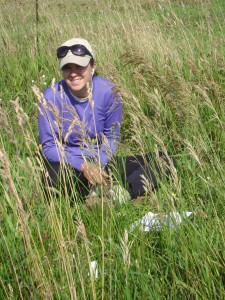“Morgan Rogge is a Middlebury College senior majoring in Biology with environmental studies and Spanish minors. This summer, she was given the opportunity to intern with the Islands Chapter of the Nature Conservancy on Martha’s Vineyard.”
I applied to the internship hoping to gain some experience in the area of conservation, a focus of the natural sciences that I am very interested in. With a biology major and environmental studies/Spanish minors, I have always considered going into the field of conservation because of the importance of this work to maintaining biodiversity and healthy ecosystems in general. The native habitat on Martha’s Vineyard, the coastal sand plains ecosystem, is highly threatened today, both by development and by invasive species. The Nature Conservancy is dedicated to conserving this ecosystem through a number of land management practices, and through this internship I was able to learn these management techniques in a practical manner.

On a daily basis, I worked with the land steward of The Nature Conservancy’s Islands project, Liz Loucks, who is in charge of projects such as rare plant monitoring and invasive plant control as well as maintenance, including field mowing and building upkeep. For this reason, during my summer I did something different almost every day. One day I might have helped to monitor blue-eyed grass, a threatened wildflower, the next I may have mowed a field with the brush cutter and a tractor, the next I may have helped Jeremy, the plant nursery manner, weed and collect seed, or I may have used Geographic Information Systems in the office to map the plant populations we looked at.
The spectrum of projects I was a part of was huge, and included soil chemistry lab work, shorebird monitoring with Mass Audubon, river otter tracking near the shoreline, tick collecting for use in studies of tick-borne diseases, seed processing for restoration, vegetation monitoring with interns from Harvard Forest, and philanthropy events, to name a few. The variety of work I did made each day different and exciting, and the amount of learning I did seems impossible to fit into three mere months. From plant identification and their scientific names to how to safely operate power tools and tractors, it seemed like every day brought new challenges and opportunities to learn, which to me was the best part of this internship. I always looked forward to meeting each day ready for anything, prepared to take on any task that was given to me with determination. It felt so empowering to finish with the day and realize that I had done numerous things in that eight-hour workday that I had never done before in my life, and that the work I did was important, and had a positive impact on an ecologically significant habitat.
I felt prepared going into the internship because of the many lab classes I have taken, which gave me a strong background in both conservation theory and field techniques. However, I also learned things that cannot be taught in the classroom, although I certainly believe that the knowledge I gained will be applicable in this setting. For example, I had forgotten most of my knowledge of plant biology before beginning my internship, but my constant work with plants over the summer taught me in a way that was particularly memorable, and that will hopefully give me an edge as I embark on “Biology of Plants” in the fall. Additionally, doing fieldwork over the summer allowed me to practice lab techniques that I have used in the past, and see how they are applied to conservation work in the real world. Moreover, the things I learned during this internship have lead to new interests; for example, I always thought that I was more interested in animal biology than plant biology, but my focus this summer on plant ecology has awoken a new curiosity in me that I never knew existed.
Through this internship, I realized how fulfilling it was to work towards something as important as the conservation of a rare ecosystem, which really made me feel like I was part of something larger than myself. That type of career is so crucial in maintaining biodiversity and preventing the extinction of threatened plants and animals that I feel proud to have been able to put my effort into helping perform the job. I would certainly consider land stewardship as a job option in the future, because the work was not only fun and challenging, but also highly important. I look forward to applying my learning in the coming months and years, because the conservation practices I learned this summer will certainly be crucial to the future of the coastal sand plains ecosystem and to other ecosystems that have been threatened in similar ways.